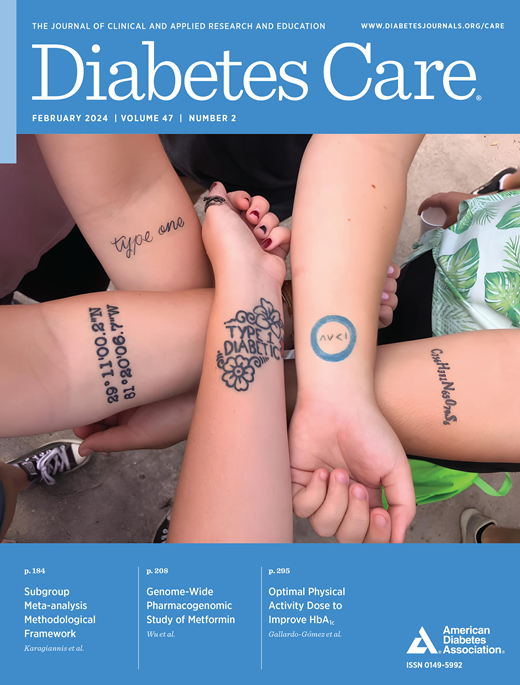Association of Water Arsenic With Incident Diabetes in U.S. Adults: The Multi-Ethnic Study of Atherosclerosis and the Strong Heart Study
IF 14.8
1区 医学
Q1 ENDOCRINOLOGY & METABOLISM
引用次数: 0
Abstract
OBJECTIVE We examined the association of arsenic in federally regulated community water systems (CWSs) and unregulated private wells with type 2 diabetes (T2D) incidence in the Strong Heart Family Study (SHFS), a prospective study of American Indian communities, and the Multi-Ethnic Study of Atherosclerosis (MESA), a prospective study of racially and ethnically diverse urban U.S. communities. RESEARCH DESIGN AND METHODS We evaluated 1,791 participants from SHFS and 5,777 participants from MESA who had water arsenic estimates available and were free of T2D at baseline (2001–2003 and 2000–2002, respectively). Participants were followed for incident T2D until 2010 (SHFS cohort) or 2019 (MESA cohort). We used Cox proportional hazards mixed-effects models to account for clustering by family and residential zip code, with adjustment for sex, baseline age, BMI, smoking status, and education. RESULTS T2D incidence was 24.4 cases per 1,000 person-years (mean follow-up, 5.6 years) in SHFS and 11.2 per 1,000 person-years (mean follow-up, 14.0 years) in MESA. In a meta-analysis across the SHFS and MESA cohorts, the hazard ratio (95% CI) per doubling in CWS arsenic was 1.10 (1.02, 1.18). The corresponding hazard ratio was 1.09 (0.95, 1.26) in the SHFS group and 1.10 (1.01, 1.20) in the MESA group. The corresponding hazard ratio (95% CI) for arsenic in private wells and incident T2D in SHFS was 1.05 (0.95, 1.16). We observed statistical interaction and larger magnitude hazard ratios for participants with BMI <25 kg/m2 and female participants. CONCLUSIONS Low to moderate water arsenic levels (<10 µg/L) were associated with T2D incidence in the SHFS and MESA cohorts.水砷与美国成人糖尿病发病率的关系:多种族动脉粥样硬化研究和强心研究
目的 我们研究了美国印第安人社区前瞻性研究 "强心家庭研究"(SHFS)和美国城市种族和民族多样性社区前瞻性研究 "多种族动脉粥样硬化研究"(MESA)中联邦政府监管的社区供水系统(CWS)和未受监管的私人水井中的砷与 2 型糖尿病(T2D)发病率的关系。研究设计与方法 我们评估了 1,791 名来自 SHFS 的参与者和 5,777 名来自 MESA 的参与者,他们都有水砷估计值,并且在基线(分别为 2001-2003 年和 2000-2002 年)时没有 T2D。对参与者的 T2D 发病情况进行随访,直至 2010 年(SHFS 队列)或 2019 年(MESA 队列)。我们使用 Cox 比例危害混合效应模型来考虑家庭和居住地邮编的聚类,并对性别、基线年龄、体重指数、吸烟状况和教育程度进行了调整。结果 在 SHFS 中,T2D 发病率为每千人年 24.4 例(平均随访 5.6 年),在 MESA 中为每千人年 11.2 例(平均随访 14.0 年)。在一项横跨 SHFS 和 MESA 队列的荟萃分析中,CWS 砷每增加一倍的危险比(95% CI)为 1.10(1.02, 1.18)。SHFS 组的相应危险比为 1.09 (0.95, 1.26),MESA 组为 1.10 (1.01, 1.20)。私人水井中的砷与 SHFS 中 T2D 发生率的相应危险比(95% CI)为 1.05 (0.95, 1.16)。我们观察到统计交互作用,体重指数为 25 kg/m2 的参与者和女性参与者的危险比值更大。结论 在 SHFS 和 MESA 队列中,中低水平的水砷(<10 µg/L)与 T2D 发病率有关。
本文章由计算机程序翻译,如有差异,请以英文原文为准。
求助全文
约1分钟内获得全文
求助全文
来源期刊

Diabetes Care
医学-内分泌学与代谢
CiteScore
27.80
自引率
4.90%
发文量
449
审稿时长
1 months
期刊介绍:
The journal's overarching mission can be captured by the simple word "Care," reflecting its commitment to enhancing patient well-being. Diabetes Care aims to support better patient care by addressing the comprehensive needs of healthcare professionals dedicated to managing diabetes.
Diabetes Care serves as a valuable resource for healthcare practitioners, aiming to advance knowledge, foster research, and improve diabetes management. The journal publishes original research across various categories, including Clinical Care, Education, Nutrition, Psychosocial Research, Epidemiology, Health Services Research, Emerging Treatments and Technologies, Pathophysiology, Complications, and Cardiovascular and Metabolic Risk. Additionally, Diabetes Care features ADA statements, consensus reports, review articles, letters to the editor, and health/medical news, appealing to a diverse audience of physicians, researchers, psychologists, educators, and other healthcare professionals.
 求助内容:
求助内容: 应助结果提醒方式:
应助结果提醒方式:


